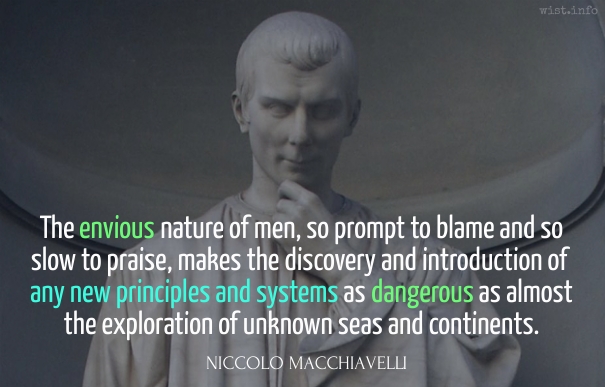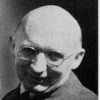CONGRATULATION, n. The civility of envy.
Ambrose Bierce (1842-1914?) American writer and journalist
“Congratulation,” The Cynic’s Word Book (1906)
(Source)
Included in The Devil's Dictionary (1911). Originally published in the "Devil's Dictionary" column in the San Francisco Wasp (1881-08-12).
Quotations about:
jealousy
Note not all quotations have been tagged, so Search may find additional quotes on this topic.
Envy iz sutch a constant companyun, that if we find no one abuv us to envy, we will envy thoze below us.
[Envy is such a constant companion, that if we find no one above us to envy, we will envy those below us.]
Josh Billings (1818-1885) American humorist, aphorist [pseud. of Henry Wheeler Shaw]
Everybody’s Friend, Or; Josh Billing’s Encyclopedia and Proverbial Philosophy of Wit and Humor, “Plum Pits” (1874)
(Source)
There is no joy on this earth like falling in love with a woman and managing at the same time the trick of keeping just enough perspective to see her fall in love too, to see her begin to see you in a different way, to see her color change, eyes soften, her hand of itself reach for you. … And there is no pain on this earth like seeing the same woman look at another man the way she once looked at you.
The envious nature of men, so prompt to blame and so slow to praise, makes the discovery and introduction of any new principles and systems as dangerous as almost the exploration of unknown seas and continents.
Moral indignation is in most cases 2 percent moral, 48 percent indignation, and 50 percent envy.
Vittorio De Sica (1901-1974) Italian neorealist director and actor
In The Observer (1961)
See also H. G. Wells.
ORLANDO: But, O, how bitter a thing it is to look into happiness through another man’s eyes!
William Shakespeare (1564-1616) English dramatist and poet
As You Like It, Act 5, sc. 2, l. 45ff (5.2.45) (1599)
(Source)
The first thing that happens to men once they have had to give up any pleasure, whether for propriety’s sake, or from satiety, or for their health, is to condemn it in other people. Such behavior implies a sort of attachment to the very things one has just renounced: we want nobody else to enjoy the good things that we have lost; it is a feeling of jealousy.
[La première chose qui arrive aux hommes après avoir renoncé aux plaisirs, ou par bienséance, ou par lassitude, ou par régime, c’est de les condamner dans les autres. Il entre dans cette conduite une sorte d’attachement pour les choses mêmes que l’on vient de quitter; l’on aimerait qu’un bien qui n’est plus pour nous ne fût plus aussi pour le reste du monde: c’est un sentiment de jalousie.]
Jean de La Bruyère (1645-1696) French essayist, moralist
The Characters [Les Caractères], ch. 11 “Of Mankind [De l’Homme],” § 112 (11.112) (1688) [tr. Stewart (1970)]
(Source)
(Source (French)). Alternate translations:
The first thing men do, when they have renounc'd pleasure, either out of decency, surfeit, or conviction, is to condemn it in others. This sort of management is however seldom free from a particular affection for those very things they left off, but they would have no body enjoy the pleasure they can no longer enjoy themselves, which proceeds more from Jealousie than any thing else.
[Bullord ed. (1696)]
The first thing Men do, when they have renounc'd Pleasure, either out of Decency, Surfeit, or Conviction, is to condemn it in others. They preserve, in this Conduct, a sort of Affection for the very things they left off; they would have no body enjoy the Pleasure they can no longer enjoy themselves: 'Tis a sentiment of Jealousy.
[Curll ed. (1713)]
The first Thing, when Men have renounced Pleasure, either out of Decency, Satiety, or Necessity, is to condemn it in others. This Sort of Reproof, however, is not free from a latent Affection for their forsaken Pleasures; they would interdict to all others what they can themselves no longer enjoy; their Admonitions are the Snarlings of Jealousy, not the Dictates of Purity.
[Browne ed. (1752)]
The first thing men do when they have renounced pleasure, through decency, lassitude, or for the sake of health, is to condemn it in others. Such conduct denotes a kind of latent affection for the very things they left off; they would like no one to enjoy a pleasure they can no longer indulge in; and thus they show their feelings of jealousy.
[tr. Van Laun (1885)]
There is nobody so irritating as somebody with less intelligence and more sense than we have.
Don Herold (1889-1966) American humorist, cartoonist, author
So Human, “Shetland Ponies vs. Autos,” epigraph (1924)
(Source)
Why should man be afraid to think, and why should he fear to express his thoughts? Is it possible that an infinite Deity is unwilling that a man should investigate the phenomena by which he is surrounded? Is it possible that a god delights in threatening and terrifying men? What glory, what honor and renown a god must win on such a field! The ocean raving at a drop; a star envious of a candle; the sun jealous of a fire-fly.
Robert Green Ingersoll (1833-1899) American lawyer, agnostic, orator
“Heretics and Heresies” (1874)
(Source)
Anger and jealousy can no more bear to lose sight of their objects than love.
George Eliot (1819-1880) English novelist [pseud. of Mary Ann Evans]
The Mill on the Floss (1860)
(Source)
















